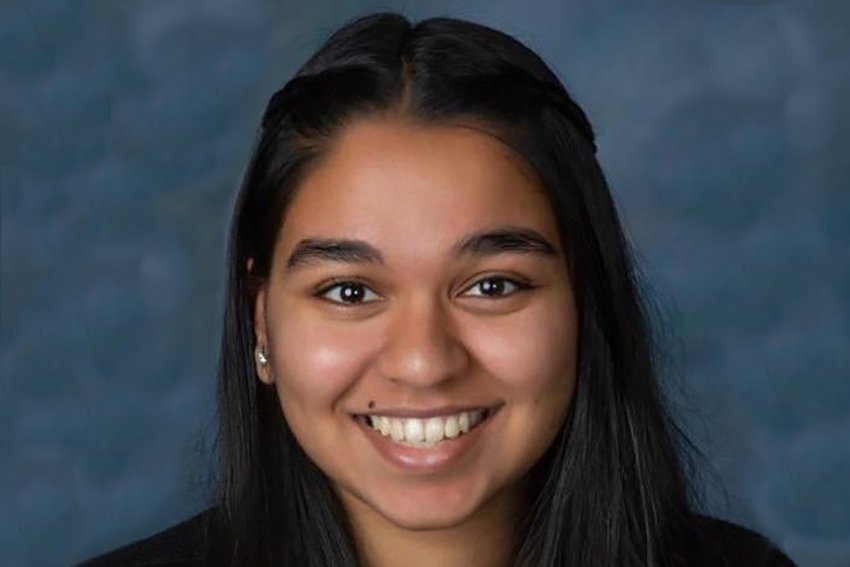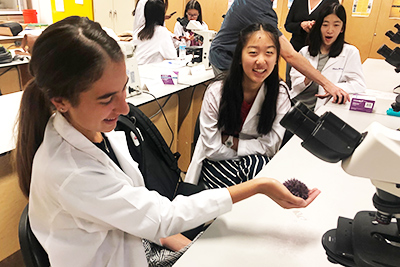6 February 2020
STEM Program Guides High School Senior on the Path to Medicine
By Stephanie Stevens

Name: Ruchi Agashe
Age: 17
High School: Canyon Crest Academy
The numbers don’t lie: women and students of color are underrepresented in most STEM fields. The reasons are complex, but a key component to increasing equity is providing more access to quality education.
Enter the Reproductive and Oncofertility Science Academy (ROSA) at UC San Diego. What began in 2008 as the NIH-grant funded Oncofertility Saturday Academy has evolved into a hands-on educational program designed to inspire junior and senior high school girls to become the next generation of scientists and physicians. Graduates emerge from the summer program with a greater understanding of science and research related to oncofertility and many have gone on to successful careers in science, math, engineering and technology.
High school senior Ruchi Agashe went through the ROSA program in the summer of 2018 and credits the program with allowing her interest in biology to blossom into a passion for reproductive science as well as developing a new network of friends and future colleagues.
How did you get into the ROSA program?
To take part, I first had to complete an online application, which consisted of essays, letters of recommendation, and an interview. I was one of fourteen girls selected to participate in the six-week summer program. One part of the program was to research a topic related to either cancer or fertility. All the students made posters that we presented at the end of the program. Judges questioned us on our research and selected four students to attend the oncofertility conference based on the quality and understanding of our work.
How did attending the program and conference change your perspective on college?
Attending the program and conference gave me the opportunity to meet so many doctors and researchers in the field of oncofertility. I got to induce fertilization of sea-urchin eggs, do ultrasounds, use hysteroscopy and robotic surgery equipment, and learn about bioethics. This experience was completely different than just learning through books, lectures, and experiments. The program has given me insight into what the field of oncofertility is about and possible career options. It has also shaped what colleges I applied to since I chose colleges with strong biology programs.
What colleges have you been accepted to and where do you plan/hope to attend?
So far, I have been accepted to Yale University through the early action program, and I will most likely attend this fall.
 What will your major be?
What will your major be?
I plan to major in Molecular, Cellular, and Developmental Biology and possibly minor or take classes in Women’s, Gender, and Sexuality Studies.
How did you select the major (or potential major) that you chose? Why?
I selected these potential majors based on my interest in biology. In high school, I took every biology class I could. My favorites were Anatomy and Physiology, Research Methods, and AP Biology. My love for biology is matched with my passion for feminist advocacy, which I’ve explored through debate. The convergence between health care and women’s rights is what I want to do with my life. I want to help women and minorities whose health concerns are often downplayed, and I want to amplify the voices of women and minorities in medicine.
What career do you hope to pursue when you graduate college?
I hope to go to medical school after college and later specialize in OB-GYN. Specifically, I am interested in gynecologic oncology and reproductive endocrinology and infertility.
Would you recommend the pre-college programs you participated in to others?
I would definitely recommend ROSA to others, regardless of whether a student is certain about what they want to study. ROSA reaffirmed my interest in biology and allowed me to develop a passion for reproductive science, a subject that I now hope to base my career on. It is also a great way to stay productive during the summer and make tons of friends and connections!
Do you think they played a factor in your college applications?
I included my participation in ROSA and the oncofertility conference in the activities section of my application and wrote about my experience in my essays. I think my obvious passion for the subject and development of my passion through extra-curricular activities and summer programs must have played a role in my admission to Yale.
What advice would you give to other students a year or two younger than you if they plan to make the most of their education and pursue college?
My advice is to explore different subjects and take full advantage of opportunities. Don’t be afraid to reach out to professionals in your field of interest to learn more about their work. A simple email could land you an internship opportunity or summer position. If you’re unsure about what you want to do in the future, try new things: join clubs, apply to summer programs, take different classes, etc. You never know what you might love.
Learn more about our Pre-College programs on our website including test prep, Academic Connections, Futures and more.